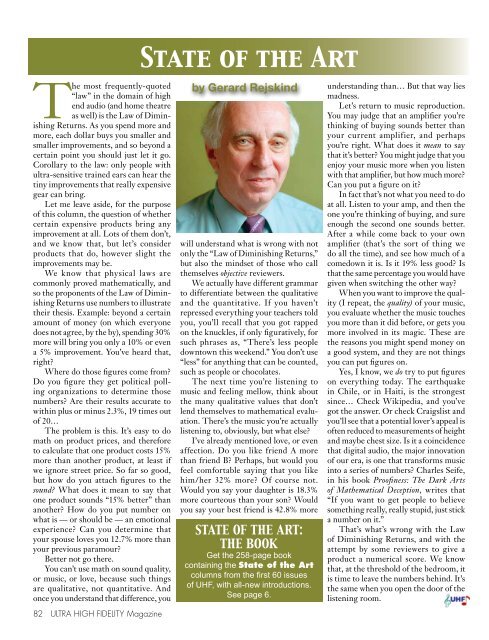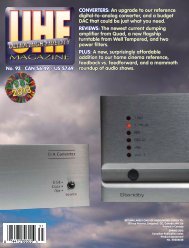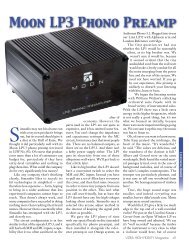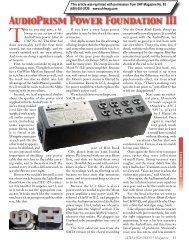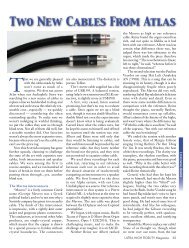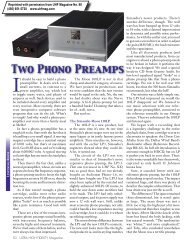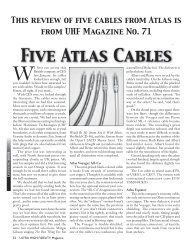A Terrific Tube Preamplifier From Korea, And A - Ultra High Fidelity ...
A Terrific Tube Preamplifier From Korea, And A - Ultra High Fidelity ...
A Terrific Tube Preamplifier From Korea, And A - Ultra High Fidelity ...
Create successful ePaper yourself
Turn your PDF publications into a flip-book with our unique Google optimized e-Paper software.
The most frequently-quoted<br />
“law” in the domain of high<br />
end audio (and home theatre<br />
as well) is the Law of Diminishing<br />
Returns. As you spend more and<br />
more, each dollar buys you smaller and<br />
smaller improvements, and so beyond a<br />
certain point you should just let it go.<br />
Corollary to the law: only people with<br />
ultra-sensitive trained ears can hear the<br />
tiny improvements that really expensive<br />
gear can bring.<br />
Let me leave aside, for the purpose<br />
of this column, the question of whether<br />
certain expensive products bring any<br />
improvement at all. Lots of them don’t,<br />
and we know that, but let’s consider<br />
products that do, however slight the<br />
improvements may be.<br />
We know that physical laws are<br />
commonly proved mathematically, and<br />
so the proponents of the Law of Diminishing<br />
Returns use numbers to illustrate<br />
their thesis. Example: beyond a certain<br />
amount of money (on which everyone<br />
does not agree, by the by), spending 30%<br />
more will bring you only a 10% or even<br />
a 5% improvement. You’ve heard that,<br />
right?<br />
Where do those figures come from?<br />
Do you figure they get political polling<br />
organizations to determine those<br />
numbers? Are their results accurate to<br />
within plus or minus 2.3%, 19 times out<br />
of 20…<br />
The problem is this. It’s easy to do<br />
math on product prices, and therefore<br />
to calculate that one product costs 15%<br />
more than another product, at least if<br />
we ignore street price. So far so good,<br />
but how do you attach figures to the<br />
sound? What does it mean to say that<br />
one product sounds “15% better” than<br />
another? How do you put number on<br />
what is — or should be — an emotional<br />
experience? Can you determine that<br />
your spouse loves you 12.7% more than<br />
your previous paramour?<br />
Better not go there.<br />
You can’t use math on sound quality,<br />
or music, or love, because such things<br />
are qualitative, not quantitative. <strong>And</strong><br />
once you understand that difference, you<br />
82 ULTRA HIGH FIDELITY Magazine<br />
State of the Art<br />
by Gerard Rejskind<br />
will understand what is wrong with not<br />
only the “Law of Diminishing Returns,”<br />
but also the mindset of those who call<br />
themselves objective reviewers.<br />
We actually have different grammar<br />
to differentiate between the qualitative<br />
and the quantitative. If you haven’t<br />
repressed everything your teachers told<br />
you, you’ll recall that you got rapped<br />
on the knuckles, if only figuratively, for<br />
such phrases as, “There’s less people<br />
downtown this weekend.” You don’t use<br />
“less” for anything that can be counted,<br />
such as people or chocolates.<br />
The next time you’re listening to<br />
music and feeling mellow, think about<br />
the many qualitative values that don’t<br />
lend themselves to mathematical evaluation.<br />
There’s the music you’re actually<br />
listening to, obviously, but what else?<br />
I’ve already mentioned love, or even<br />
affection. Do you like friend A more<br />
than friend B? Perhaps, but would you<br />
feel comfortable saying that you like<br />
him/her 32% more? Of course not.<br />
Would you say your daughter is 18.3%<br />
more courteous than your son? Would<br />
you say your best friend is 42.8% more<br />
STATE OF THE ART:<br />
THE BOOK<br />
Get the 258-page book<br />
containing the State of the Art<br />
columns from the first 60 issues<br />
of UHF, with all-new introductions.<br />
See page 6.<br />
understanding than… But that way lies<br />
madness.<br />
Let’s return to music reproduction.<br />
You may judge that an amplifier you’re<br />
thinking of buying sounds better than<br />
your current amplifier, and perhaps<br />
you’re right. What does it mean to say<br />
that it’s better? You might judge that you<br />
enjoy your music more when you listen<br />
with that amplifier, but how much more?<br />
Can you put a figure on it?<br />
In fact that’s not what you need to do<br />
at all. Listen to your amp, and then the<br />
one you’re thinking of buying, and sure<br />
enough the second one sounds better.<br />
After a while come back to your own<br />
amplifier (that’s the sort of thing we<br />
do all the time), and see how much of a<br />
comedown it is. Is it 19% less good? Is<br />
that the same percentage you would have<br />
given when switching the other way?<br />
When you want to improve the quality<br />
(I repeat, the quality) of your music,<br />
you evaluate whether the music touches<br />
you more than it did before, or gets you<br />
more involved in its magic. These are<br />
the reasons you might spend money on<br />
a good system, and they are not things<br />
you can put figures on.<br />
Yes, I know, we do try to put figures<br />
on everything today. The earthquake<br />
in Chile, or in Haiti, is the strongest<br />
since… Check Wikipedia, and you’ve<br />
got the answer. Or check Craigslist and<br />
you’ll see that a potential lover’s appeal is<br />
often reduced to measurements of height<br />
and maybe chest size. Is it a coincidence<br />
that digital audio, the major innovation<br />
of our era, is one that transforms music<br />
into a series of numbers? Charles Seife,<br />
in his book Proofiness: The Dark Arts<br />
of Mathematical Deception, writes that<br />
“If you want to get people to believe<br />
something really, really stupid, just stick<br />
a number on it.”<br />
That’s what’s wrong with the Law<br />
of Diminishing Returns, and with the<br />
attempt by some reviewers to give a<br />
product a numerical score. We know<br />
that, at the threshold of the bedroom, it<br />
is time to leave the numbers behind. It’s<br />
the same when you open the door of the<br />
listening room.


